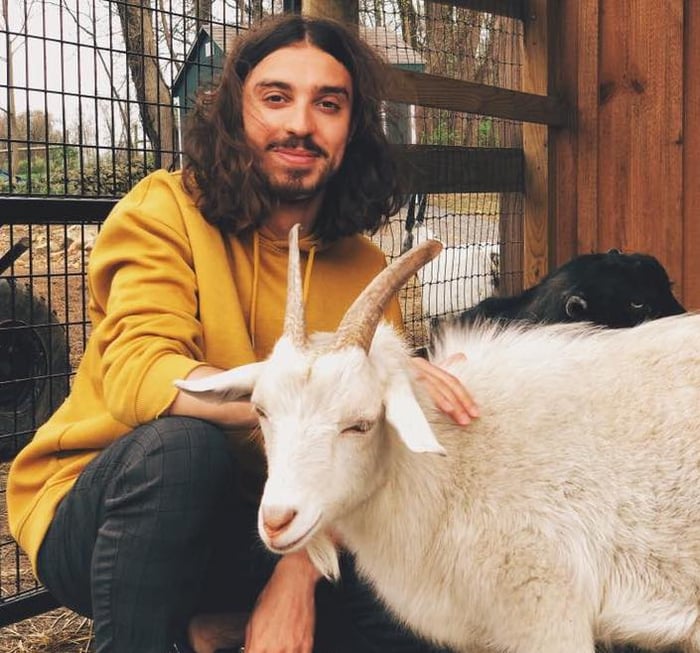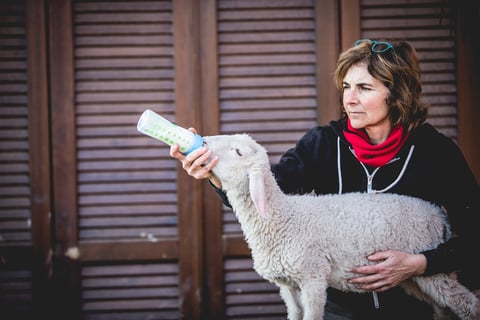 Photo: Earthling Ed
Photo: Earthling Ed
Ed Winters is a force to be reckoned with. Known by the moniker Earthling Ed, he is a well-known vegan advocate, content creator, author, and leader.
“Every time we eat, we have the power to radically transform the world we live in,” is his favorite mantra. He has repeated this in every speech and video we’ve seen over the years.
Note though, he’s not just a man who delivers heart-rending speeches, he walks the walk. The list of his accomplishments is impressive and ever-growing. In 2018, Ed announced the opening of Unity Diner, a non-profit vegan restaurant in London where all profits go directly back into helping animals.
In 2020, he founded Surge Sanctuary, a forever home to abused and unwanted animals on an 18-acre site in England. The establishment is currently home to over 100 rescued animals.
Two years later, in January 2022, he published his debut book, “This is Vegan Propaganda: (& Other Lies the Meat Industry Tells You)”. It has been lauded as a groundbreaking and empowering book for vegans and skeptics alike.
We caught up with the beloved activist to find out his reasons for going vegan and how highlighting the lifestyle is a powerful way to help people walk the same path.
What was your connection to animals growing up?
I actually had very little connection to animals growing up. I never had any companion animals and so was very rarely in the company of dogs, cats or any other animals that many of us grow up alongside. The only real connection I had to animals was the fact that I paid for them to be exploited and as a consequence, my view of animals was quite cold and dismissive. It wasn’t until I was 19, when I bought a hamster, that I developed a close attachment to an animal for the first time.
Was there a defining moment that made you go vegan and an advocate?
There were definitely a few moments that made me reflect on my consumption of animal products but the main incident happened on the 14th of May 2014 when I came across a BBC article with the headline ‘Hundreds of chickens killed in M62 lorry crash’: I read that 1,600 chickens had been killed in this truck crash, with many of the chickens being killed from being run over by cars as they wandered out into the road.
I thought to myself about how much pain these animals must be in and about how much they were suffering, and then it clicked in my mind that the animals I was eating had the capacity to suffer. My mind went to my fridge, inside which was leftover KFC from my dinner the previous night and I suddenly felt like a complete hypocrite.
After this incident, my girlfriend and I became vegetarian and then we became vegan after we watched the documentary Earthlings. In fact, after the documentary had finished, I decided to spend some time with Rupert the hamster. As I watched Rupert eating his broccoli, I thought about how he was an individual with his own personality, and his own likes and dislikes. I thought about Rupert in pain, or someone hurting him and how devastating that would be.
 Photo: Earthling Ed
Photo: Earthling Ed
What's the story behind starting Surge?
We founded Surge back in 2016 because we wanted to create an animal rights group that would be centered on positive community building. So at the beginning, we focused on doing lots of street outreach events as well as The Official Animal Rights March. Over the years, our focus has turned more towards creating online content. Now we focus on producing high-quality videos, articles and graphics. We also run a campus rep programme on university campuses where we give students educational materials and a food budget for them to get vegan food samples.
What to you is the single most important thing for an individual to end the cruelty and the exploitation of animals?
Very simply, the first step is to become educated on the problem and as a consequence of that, become vegan, and then become an educator and show others why they should be vegan too. It’s important for us to recognize just how much power we have to shape what the future will look like and understand that whenever we opt for a product that comes from animals, we’re perpetuating a system of oppression and violence towards animals.
What is the standard argument against veganism that you have heard and how would you respond to it?
There are whole host of arguments against veganism that we hear so often, but one of the main ones is that vegans should respect other peoples’ personal choices. In truth, it is a personal choice to eat animal products in the same way that it’s a personal choice to abuse a dog or rob an elderly person. In fact, almost every choice we make is a personal choice and so an action isn’t automatically morally justified simply because it is a personal choice. Plus, what about the personal choice of the animals who don’t willfully walk into the stun box or gas chamber in slaughterhouses but are instead forced into them against their will?
Ultimately, if exploiting animals is a choice, then why choose to be cruel?
See Also: Jane Goodall wants to plant one trillion trees by 2030
You and your team at Surge have conducted groundbreaking investigations. Which of the investigations was the most shocking to you? What did you discover?
It’s hard to only pick one campaign to highlight because all of them have been so shocking. However, I think our Dismantle Dairy campaign was our most impactful because it truly exposed the UK dairy industry for what it is. Part of the investigation was filmed at a farm that is co-owned by a high profile animal farming advocate called Guy Smith, who at the time of filming was the deputy president of the National Farmers’ Union, which is the biggest farming organization in the UK.
At the farm we exposed workers punching, hitting and terrorizing the cows. We also exposed a farm that supplies goat’s milk to the company St Helen’s, who label their products as ‘gentle’ goat milk. We filmed workers again punching the animals and throwing them around, which was extremely harrowing. However, it just goes to show the labels these companies use to advertise their products are nothing more than marketing and don’t mean anything when it comes to how the animals are actually treated.
What is the biggest challenge you’ve faced while conducting those groundbreaking investigations?
I think the biggest challenge we face with these investigations is making sure that people are aware that the farms that are being exposed are not just bad apples but instead the whole tree is rotten. It’s so vital that people recognize that animal cruelty is ubiquitous on animal farms and it also includes the standard legal practices as well, which also cause suffering and harm to animals.
 Photo: Earthling Ed
Photo: Earthling Ed
What is the most rewarding aspect as an activist?
Spending time with the animals we’ve rescued at the Surge Sanctuary is one of the most rewarding aspects of the journey so far, alongside receiving extremely kind and thoughtful emails or letters from people who have gone vegan from my work.
Your team is working on a documentary that focuses on slaughterhouse workers. Can you tell us more about this?
We had been wanting to create a video about slaughterhouse workers for a long time. While some of our past content has highlighted how humans are affected by the livestock industry—floods and droughts caused by climate change, the negative consequences animal products have on human health, etc—we decided to create this campaign specifically to highlight how individuals working directly in this industry are exploited as well and suffer from severe psychological problems as a result of the work that they do.
Can you elaborate on how factory farming is a threat to all?
In factory farms—large-scale industrial operations—thousands of animals are raised for food. The animals are mainly fed corn, wheat and soy that are grown through conventional farming, using large amounts of pesticides. They are treated with antibiotics to prevent disease and maximize their growth and food output, which is the leading driver in the rise of antibiotic-resistant bacteria.
Factory farms pose various environmental hazards, such as water, land and air pollution stemming from animal waste and the extreme confinement creates the perfect environment for the creation and spread of infectious diseases such as bird flu and swine flu, which could, in turn, cause the next pandemic. However, these issues are not simply found in factory farms, as less intensive systems of farming are also hugely damaging for the environment (sometimes even more so than factory farms).
The United Nations even recognized the threat of animal farming as far back as 2006, when they stated: “The livestock sector emerges as one of the top two or three most significant contributors to the most serious environmental problems, at every scale from local to global. The findings of this report suggest that it should be a major policy focus when dealing with problems of land degradation, climate change and air pollution, water shortage and water pollution, and loss of biodiversity.”
 Photo: Earthling Ed
Photo: Earthling Ed
What inspired you to write a book in the age of the internet when attention spans seem so short?
I wanted to write a book that would empower vegans to learn more about the issues of animal exploitation so that as a result they would feel more confident and capable of talking about veganism to the non-vegans in their life. But I also wanted this book to be for non-vegans, for non-vegans who are already interested in veganism as well as for non-vegans who are skeptical about veganism.
Plus, a book gave me the opportunity to put so much of what I wanted to say in one place, without many of the restrictions that come from uploading content online. While attention spans seem to be getting shorter, it’s also the case that people will always read books and look to books as a way of getting a more detailed and informative explanation of the issues they care about.
See Also: For author Momoko Nakamura, veganism in Japan is closely tied with nature








